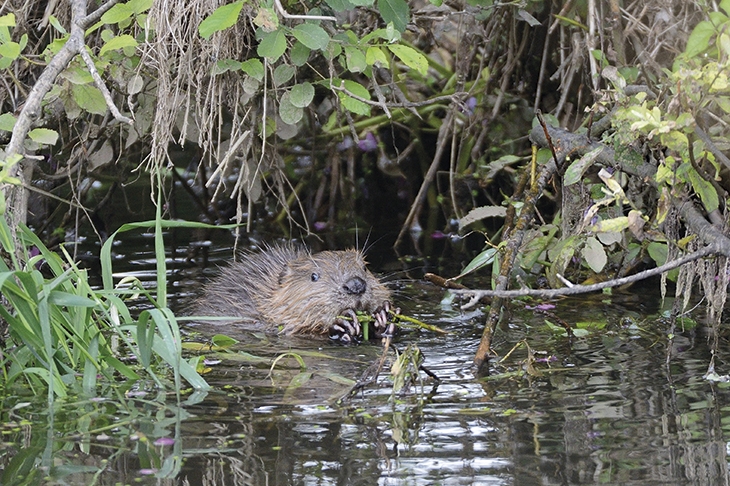Conservationists are frequently criticized for focusing on glamorous species at the expense of others equally important but unluckily uglier — pandas rather than pangolins, birds rather than bats, and monkeys rather than mole-rats. Europe’s frankly lumpy largest rodent, the European beaver, Castor fiber, is therefore fortunate to have found an ardent advocate in Derek Gow.
Beavers have always attracted attention, generally of the wrong kind. Not only do they have lustrous pelts, and flesh edible even in times of fasting (because conveniently classified as ‘fish’) but castoreum, exuded from sacs near their anal glands, which they use to scent mark territory, was thought to have medico-mystical properties. Medieval apiarists believed it made bees more productive, it was the original castor in castor oil (it can contain salicylic acid, aspirin’s main ingredient), and it is still used to add ‘leather’ notes to perfumes.
In Britain’s relatively small riparian spaces, the beaver seems to have become rare in England as early as Anglo-Saxon times. But Beverley in Yorkshire derives from ‘beaver-clearing’ (named c. 710), and other poignant place names attest to old presence, like the ghost pains felt by amputees — although beaver is also a verb, associated with fermenting woad. The animals feature in the legend of St Felix of Burgundy, rescued from drowning by beavers in Norfolk.
They have also made it to blazons, like Newark-on-Trent’s arms, granted in 1561 — although it is unlikely Elizabethans saw them, unless fur-trapping in opening-up New England, whence pelts were sent back by shiploads, to the disgust of moralists. William Harrison’s 1577 Description of England, however, contains a realistic account of handling beavers, and Gow has unearthed a 1789 Yorkshire church warden’s account of twopence being paid for a ‘bever head’. In Wales, 10th-century statutes preserve Afangc fur for royal use, and Gerald of Wales wrote of beavers on the River Teifi in 1188, so it seems they were there at least that late. They lingered longest in Scotland, where they were occasionally caught in the Great Glen into the 16th century (Inverness was a major fur-trading market).
Since 2006, they have been back in Scotland, officially released in Argyll, and surfacing mysteriously on the Isla and Tay. In England, they can be seen on Devon’s river Otter, and projects are afoot in Cornwall and Kent. Welsh anglers are fuming illogically about a pair released illegally six years ago along the river Dyfi, into which ecologists have applied to release 10 more pairs.
[special_offer]
Gow, born in the Borders but long domiciled in Devon, has been instrumental in much of this. Unlike most rewilders, he is a real countryman, with vivid memories of old-breed livestock and thrumming market towns. He is strong-willed, called ‘a one-man wrecking ball’ because of his brusque impatience with over-cautious committees, unimaginative obscurantists and the vigilantes who creep out on rural gloamings to kill what they cannot understand. Luckily, he can also be discreet, funny and pragmatic.
He champions beavers convincingly as keystone species whose absence impoverishes everyone, even those agriculturists, anglers, foresters and landowners who oppose their reintroduction most vehemently. He argues for them as flood-controllers, biodiversity-bringers, soil-enrichers and deeply likable animals, who have a moral right to be in places where sometimes their ancient traces can still be seen. Bruised British landscapes badly need their ‘subtile wilinesse’ (William Camden) and ‘admirable cleverness’ (Linnaeus) to restore flattened contours, and bring life bounding back to drearily sheep-shorn and regimented rurality.
There will always be problems with rewilding schemes, but with goodwill they can be overcome, and all will benefit. This authentic, impassioned manifesto-cum-memoir will hopefully have a major impact on what is likely to be a long-running controversy.
This article was originally published in The Spectator’s UK magazine. Subscribe to the US edition here.

























